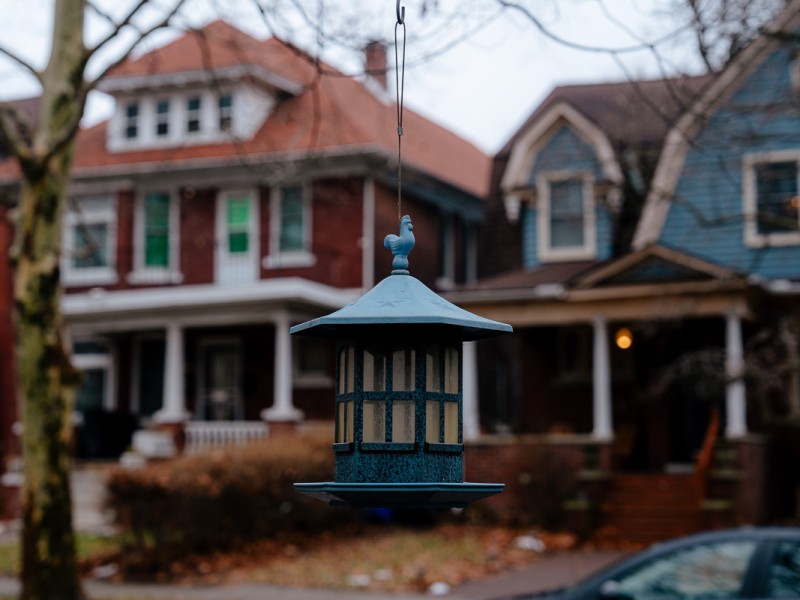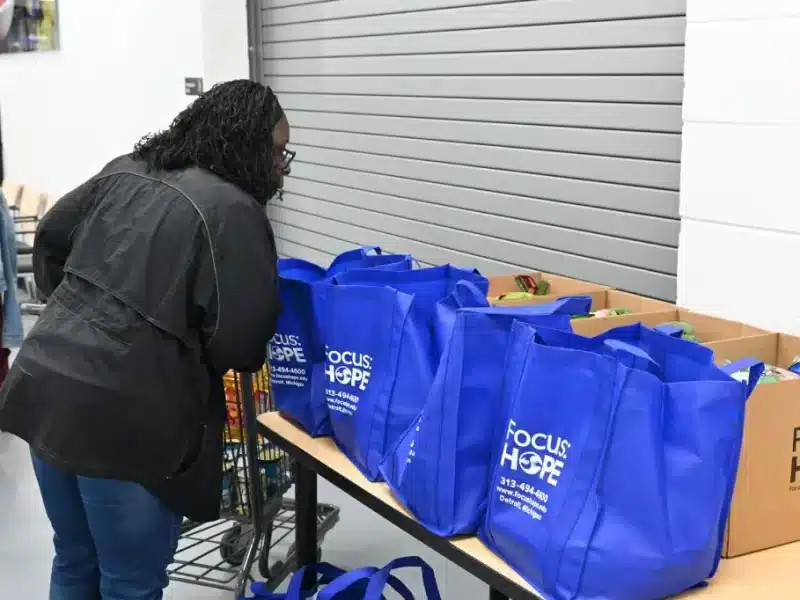Model D-Troiter: Enrico Roselli of La Dolce Vita
Whether it’s summer nights on the patio or Sundays for brunch, or dreaming of bigger things, Enrico Roselli brings the good life to Detroit via his restaurant, La Dolce Vita.
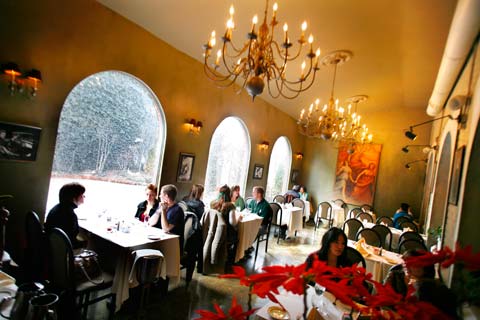
Sunday brunch at La Dolce Vita finds a young woman bouncing a toddler on her knees, a party of 12 drinking mimosas and martinis to a 30th birthday celebrant, a Caribbean jazz combo heating up the proverbial pancakes and a flurry of conversations filling the faux marble interior.
Politicians, celebrities, nonprofit leaders and everyday seekers enjoy a cheap Roman holiday inside the convivial restaurant on the outskirts of Palmer Park.
Pewter chandeliers lend ambient light to the romantic, seductive environment, named for the 1960 Federico Fellini movie starring Marcello Mastrianni, Anita Ekberg and Anouk Aimee about the pursuit of the good life.
 Enrico Roselli, a silver-haired restaurateur sporting an Armani shirt and slacks, kicks back with a fruit plate, eggs Benedict and bottle of champagne to celebrate a restaurant the generates over $1 million a year in revenues.
Enrico Roselli, a silver-haired restaurateur sporting an Armani shirt and slacks, kicks back with a fruit plate, eggs Benedict and bottle of champagne to celebrate a restaurant the generates over $1 million a year in revenues.
Since 1994, the charming immigrant from Calabria, Italy, has renovated the bar, added a banquet room and built apartments upstairs. In summer, the restaurant opens its magnificent patio with an ivy backdrop, Italian arias on stereo and a tiki bar serving martinis and Tuscan wines.
With animated eyes and an exuberant voice, he speaks of plans for a pizzeria and jazz club on the same block, innovative housing for homeless people and imaginative ideas for the Tiger Stadium site. Roselli find the good life in Detroit and shares it with the world.
Model D: What prompted you to buy Peter Mell’s almost defunct Saluté restaurant in 1994 and transform it into La Dolce Vita?
Roselli: I had this magical moment the minute I stepped into the patio and saw the wrought iron gate on Woodward Avenue overlooking the first mile of paved concrete in America. The place had history and a future. I saw the ivy creeping down one whole wall. I saw an Italian garden, a place with people laughing, eating, and enjoying the out of doors while opera played in the background. I knew it would be a destination for people from all over the region. If I saw it, others would too.
Model D: What did it take to get the restaurant open?
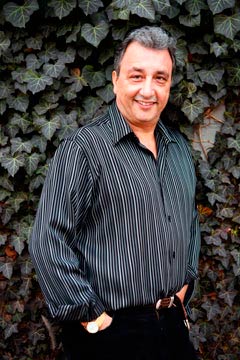 Roselli: Several banks turned me down. My friends told me I was crazy. Even my wife Denise was leery at first. I self-financed with everything I saved from 16 years in the food supply business. I paid $300,000 for the building and put $1 million into renovations. Eventually, I hope to own the whole block. Maybe a wood oven pizza place or a sushi bar and a jazz club, a Chicago-style place people would visit after dining at La Dolce Vita. (The main restaurant seats 102 people, 40 in the banquet room and 40 on the patio.)
Roselli: Several banks turned me down. My friends told me I was crazy. Even my wife Denise was leery at first. I self-financed with everything I saved from 16 years in the food supply business. I paid $300,000 for the building and put $1 million into renovations. Eventually, I hope to own the whole block. Maybe a wood oven pizza place or a sushi bar and a jazz club, a Chicago-style place people would visit after dining at La Dolce Vita. (The main restaurant seats 102 people, 40 in the banquet room and 40 on the patio.)
Model D: What brings people to your restaurant?
Roselli: People like to be peacocks. They discover a destination, something quite unlike anything else. They love to watch the expression on friend’s faces when they first come upon the patio with its red tiles, antique street lights and ivy. They step inside and they feel the warmth of the wait staff. Many of my people have been here eight, 10 years. People call up and request certain tables with Antonio, Annis or Syed. People come to hear live music six days a week.
Model D: What dishes lure people back once they discover this bistro?
Roselli: Nearly everything is delicious. The Lasagna Béchamel is my wife’s recipe. The Perch Amalfi and Veal Piccata are always popular. Caesar salads – with anchovies – are made table side. I figure business will be better this year because people can’t afford a trip to Europe. They would come here for a taste of Italy, of old Europe.
Model D: If you had an extra million dollars what would you do?
Roselli: I’d buy Tiger Stadium in a heartbeat. I’ve already worked out plans for an Italian Village. I’ve talked to Jack Cauley in West Bloomfield, asked him to open a satellite Ferrari and Maserati dealership. I’d convince retailers to sell Italian shoes, Armani clothes, leather goods and specialty wines. I’d get a good Italian bakery and a pizzeria. People would come from other cities, other states to experience everything here. It would be a real boost to tourism, to Detroit. Imagine Asian Village, Greektown, Africantown, Corktown all drawing people, augmenting the casinos and Cobo Hall.
Model D: Have you approached investors?
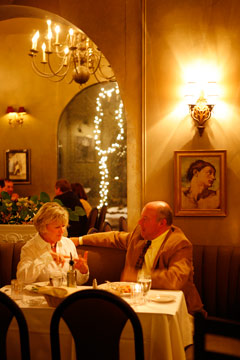 Roselli: I’m still working out the details. The plans for a South Woodward business association didn’t materialize. Not enough people came to meetings. My heart cries out for the richness of a European city where people live in houses, visit restaurants 400 years old. I think people hunger for more urban life.
Roselli: I’m still working out the details. The plans for a South Woodward business association didn’t materialize. Not enough people came to meetings. My heart cries out for the richness of a European city where people live in houses, visit restaurants 400 years old. I think people hunger for more urban life.
Model D: How can you help the poor people you see roaming the streets around the restaurant?
Roselli: We treat people with respect, ask them to help us keep a nice place in the neighborhood. Residents are proud of us being here, creating jobs. I’m working with a former UAW leader to develop low-cost housing we could put up on vacant lots. I’ve already bought materials and stored it in a warehouse. It will come to fruition.
Model D: How do you steer customers around the more frustrating elements?
Roselli: We never had a front entrance. People come around Parkhurst Street to the back of the restaurant. Valets greet them, take the vehicles and direct people through the gates into the La Dolce Vita patio.
It is enchanting. Steiner, a character in the movie, La Dolce Vita told Marcello: ‘We need to live in a state of suspended animation like a work of art, in a state of enchantment. We have to succeed in loving so greatly that we live outside of time…”
La Dolce Vita is at 17546 Woodward Ave., just north of McNichols and near Palmer Park. Call (313) 865-033.
For more on the Palmer Park area neighborhoods, check out Model D’s guides to the area.
Maureen McDonald is a Detroit resident and regular contributor to Model D.
photos:
Sunday Brunch at La Dolce Vita
Old world charm in LDV’s dining room
Enrico Roselli
Evening diners at La Dolce Vita
Photographs by Marvin Shaouni
Marvin Shaouni is the managing photographer for Model D & Metromode.

